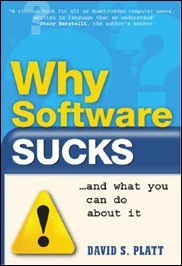Why Software Sucks…and What You Can Do About It
 |
 |
How do our users see the products we are writing for them and how happy they are with our work? Are they able to get their work done without fighting with cool features and crashes or are they just switching off resistance part of their brain to survive our software? Yeah, the overall picture of software usability landscape is not very nice. Okay, it is not even nice. But, fortunately, Why Software Sucks…and What You Can Do About It by David S. Platt explains everything.
Why Software Sucks… is book for software users but I consider it as a-must reading also for developers and specially for their managers whose politics often kills all usability topics as soon as they may appear. For managers usability is soft topic that can be manipulated the way it is best in current state of project. Although developers are not UI designers and usability experts they are still very often forced to deal with these topics and this is how usability problems start (of course, also designers are able to produce designs that are stupid and too hard to use for users, but this blog here is about development).
I found this book to be very interesting and funny reading. It is not humor book but it explains you all so you remember later very well what you just read. It took me about three evenings to go through this book and I am still enjoying what I found and how author explains our weird young working field to end users. I suggest this book to all developers – while you are demanding your management to hire or outsource usability expert you are at least causing less pain to end users. So, go and buy this book, just like I did. And… they thanks to mr. Platt :)
There is one book more I suggest you to read if you are interested in usability – Don’t Make Me Think: A Common Sense Approach to Web Usability, 2nd Edition by Steve Krug.
Editorial review from Amazon
Today’s software sucks. There’s no other good way to say it. It’s unsafe, allowing criminal programs to creep through the Internet wires into our very bedrooms. It’s unreliable, crashing when we need it most, wiping out hours or days of work with no way to get it back. And it’s hard to use, requiring large amounts of head-banging to figure out the simplest operations.
It’s no secret that software sucks. You know that from personal experience, whether you use computers for work or personal tasks. In this book, programming insider David Platt explains why that’s the case and, more importantly, why it doesn’t have to be that way. And he explains it in plain, jargon-free English that’s a joy to read, using real-world examples with which you’re already familiar. In the end, he suggests what you, as a typical user, without a technical background, can do about this sad state of our software—how you, as an informed consumer, don’t have to take the abuse that bad software dishes out.
As you might expect from the book’s title, Dave’s expose is laced with humor—sometimes outrageous, but always dead on. You’ll laugh out loud as you recall incidents with your own software that made you cry. You’ll slap your thigh with the same hand that so often pounded your computer desk and wished it was a bad programmer’s face. But Dave hasn’t written this book just for laughs. He’s written it to give long-overdue voice to your own discovery—that software does, indeed, suck, but it shouldn’t.
Table of contents
Acknowledgments xiii
Introduction
Chapter 1: Who’re You Calling a Dummy?
Where We Came From
Why It Still Sucks Today
Control versus Ease of Use
I Don’t Care How Your Program Works
A Bad Feature and a Good One
Stopping the Proceedings with Idiocy
Testing on Live Animals
Where We Are and What You Can Do
Chapter 2: Tangled in the Web
Where We Came From
How It Works
Why It Still Sucks Today
Client-Centered Design versus Server-Centered Design
Where’s My Eye Opener?
It’s Obvious—Not!
Splash, Flash, and Animation
Testing on Live Animals
What You Can Do about It
Chapter 3: Keep Me Safe
The Way It Was
Why It Sucks Today
What Programmers Need to Know, but Don’t
A Human Operation
Budgeting for Hassles
Users Are Lazy
Social Engineering
Last Word on Security
What You Can Do
Chapter 4: Who the Heck Are You?
Where We Came From
Why It Still Sucks Today
Incompatible Requirements
OK, So Now What?
Chapter 5: Who’re You Looking At?
Yes, They Know You
Why It Sucks More Than Ever Today
Users Don’t Know Where the Risks Are
What They Know First
Milk You with Cookies?
Privacy Policy Nonsense
Covering Your Tracks
The Google Conundrum
Solution
Chapter 6: Ten Thousand Geeks, Crazed on Jolt Cola
See Them in Their Native Habitat
All These Geeks
Who Speaks, and When, and about What
Selling It
The Next Generation of Geeks—Passing It On
Chapter 7: Who Are These Crazy Bastards Anyway?
Homo Logicus
Testosterone Poisoning
Control and Contentment
Making Models
Geeks and Jocks
Jargon
Brains and Constraints
Seven Habits of Geeks
Chapter 8: Microsoft: Can’t Live With ’Em and Can’t Live Without ’Em
They Run the World
Me and Them
Where We Came From
Why It Sucks Today
Damned if You Do, Damned if You Don’t
We Love to Hate Them
Plus ça Change
Growing-Up Pains
What You Can Do about It
The Last Word
Chapter 9: Doing Something About It
1. Buy
2. Tell
3. Ridicule
4. Trust
5. Organize
Epilogue
About the Author



